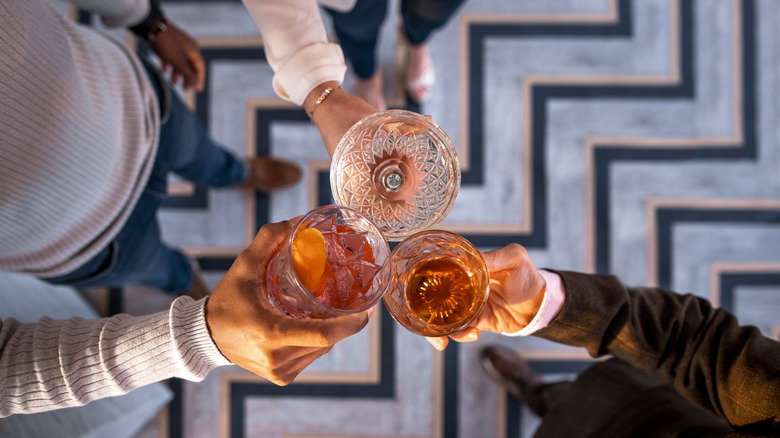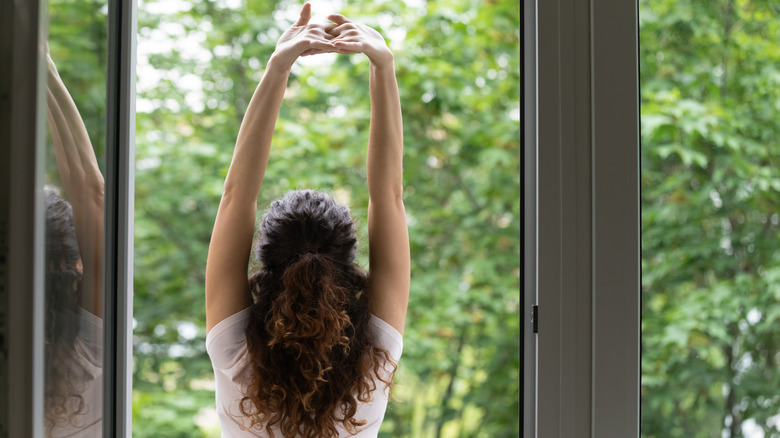Ways To Bring A Mindful Approach To Your Drinking Habits
If you've ever identified as "sober curious," then you might already be familiar with mindful drinking habits. Sober curiosity is a state of mind where you begin questioning alcohol and its very purpose — what's it like to be sober at parties and events? Why is alcohol essential to celebrating the big moments? What would an alcohol-free lifestyle look like? While you don't need to go to the extreme to be curious about a sober life, you may find yourself seeking mindful drinking habits that don't leave you hungover every weekend.
You may not have always been like this, and that's okay. In fact, it's important to face the fact that hangovers get worse as we age. You may have spent your early 20s pounding shots, chasing them with cocktails, and waking up full of energy, but that's not you anymore. Aging doesn't mean we have to retire our youthful habits, but we can be more conscious of how we've changed and what matters more to us now (like waking up on Sundays without a headache).
Summer marks a time when hot weather is combated through ice-cold drinks that are often spiked with liquor. Of course, it's fun to let loose and give yourself grace once in a while, and we sincerely hope you experience these kinds of summer days. But how far is too far? Is there a way to have fun without going overboard? Rather than forcibly policing your drinking habits, there are many ways to curtail your alcoholic tendencies in more desirable ways. If that sounds like you, you've come to the right place.
Debunking the myth of liquid courage
One of the most popular — and untrue — ideologies of drinking involves "liquid courage," or the idea that we're braver and more capable of taking risks after a couple of drinks. It's true that alcohol loosens our inhibitions, brings us relief, and creates a mild sense of euphoria. However, we are the ultimate creators of our liquid courage, mustering up bravery that already exists within us. If alcohol helps you socially lubricate, that's great. However, one mindful approach to liquid courage is refocusing yourself as the vessel; it is ultimately you that is brave and capable of achieving social euphoria.
After a few drinks, we're more likely to want more because we think it will continue to make us the social capital of the room. Unfortunately, this habit can force us to cross a line where drinking is no longer fun and a complete inhibition of our natural instincts and mannerisms. If you're someone who's often guilty of drinking more than you anticipated, starting the night by reminding yourself of who you are can help. Just like general mindfulness is a practice that develops over time, so is lowering our alcohol consumption.
Develop a pre-drinking routine
There are so many beneficial ways to prepare for a night out, and having a grounding routine before drinking can help you throughout the night. For example, hydrating all day and setting a goal to drink a certain amount of water can help flush out unnecessary toxins. If possible, a protein-based smoothie or green juice can be great for enhancing gut health. In addition, a workout routine (walking, stretching, yoga — anything is acceptable) can get your body moving in stimulating ways.
On top of beverages and workouts, it's so important to have a few substantial meals before going out. While you may have spent college surviving a night out on just a few snacks, you have an adult body to sustain now — it's time to feed it what it needs. Some of the best foods to eat before drinking include eggs, fish, yogurt, and even sweet potatoes, all of which are high in nutrients that protect the body from any alcohol-induced damage. Try not to pair any of these meals with an alcoholic drink, and instead opt for something that's both tasty and hydrating. We want you to have fun at the pregame, but not before taking the necessary steps to promote good health.
Set goals before going out
Before you head out for the night, have a general idea of how much you're planning to drink, spend, and hydrate. For example, intersperse water between one to two drinks while setting an alcohol budget, which can vary depending on where you live. If it helps, set goals with a friend who's also interested in mindfully consuming alcohol. You can also apply these goals to how many shots you take, how long you wait in between drinks, and how you'll want to feel right before bed. We don't want to be the fun police, but we want to remind you that fun doesn't require excessive drinking.
There's also a newly discovered half-and-half method, which promotes halving your drink intake by switching between alcoholic and non-alcoholic drinks (for every cocktail, have a mocktail). The idea is less restrictive than cutting out alcohol entirely, which can help encourage healthy drinking habits without immediately committing to something new. The non-alcoholic drinks you'll have are referred to as "buffers," which can be anything from sparkling water to a non-alcoholic seltzer. These drinks are also likely to have heavier pours, which will encourage you to drink slowly and with taste in mind rather than effect.
Treat every other weekend as an opportunity to recharge
Rather than going out every time the opportunity arises, being strategic about when to drink will help ease some of your impulsiveness and FOMO tendencies. After all, it's the fearful thought that we're missing out on something that drives us to go out, even on nights when we'd rather stay in. Spoiler alert — you're not really missing out on anything. Sure, your friends may remember something from the night that you weren't there for, but it will soon be replaced by a new memory where you were present (and maybe even sober).
Giving yourself the chance to recharge will help you realize that you're just fine without alcohol or even the adrenaline of going out. Sometimes all you need is a cozy night in to remember that your own company is the best, and that's what makes those nights out so special. You can call your friends, journal how you feel, and make yourself a cup of tea before bed. If you feel yourself itching to dance with your friends, you'll have recharged for tomorrow night. We recommend having a night in on Friday, which is still a weekday but commemorates the start of a weekend. If you're bored on Friday, you'll have Saturday to do what you desire.
Keep a habit journal
Every time you drink or prepare to engage in party culture, jot down how you feel before, during, and after. You can make a mental or physical note while you're out and spend a few minutes journaling after you've returned home, noting down what you drank, what the occasion was, and how you feel in the morning. You can also reflect on any feelings that come up before or while drinking to see if a certain trigger causes you to drink more. If you're lucky enough to see a mental health professional, making this a part of your therapy curriculum can help you stay on track and follow up with someone besides yourself.
Keeping a journal allows you to have a private and judgment-free space to explore all your thoughts and feelings, often without the fear that they'll be misunderstood. If you're a generally creative person, you can use this space to express your truest self, which may inadvertently curtail your drinking habits by helping you focus on another hobby. If you're someone who thinks impulsively, keeping track of your habits will naturally encourage you to think critically about your actions before falling for peer pressure.
Be patient, graceful, and gentle with yourself
No matter what, remember that you are a normal person with complicated feelings. It's human nature to engage in certain unhealthy habits, regret it, try and fix it, fail, retry, and achieve a different result. Unless your drinking habits are genuinely harmful to yourself and others, letting yourself go for a fun night out is okay, and it doesn't have to be something you regret in the morning. Most people who achieve sobriety have experienced the highs and lows of excessive drinking with many trials and errors behind them. The effort of rethinking your drinking habits is enough to know you care about your health, even if it may be hard to unlearn.
Most of the things we successfully achieve can't be done without a proper support system. Lean into your friendships as a way of giving yourself grace, remembering that they, too, are people who drink and are still worthy of feeling good. It may not be easy to rethink your habits if you've been drinking for a while now, but it will inherently force you to reimagine a world where you are the main character (not alcohol). When it's time to reel it in and recharge, you'll know — we believe in you.






